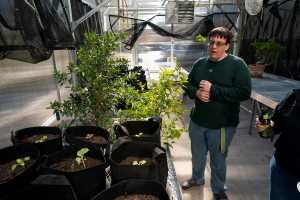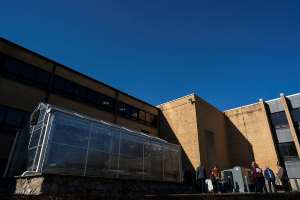Bellarmine University has a new greenhouse for faculty and student research.
With 400 square feet of floor space, nearly 200 square feet of steel-mesh tabletops and a 10-square-foot hydroponics table, the structure will provide opportunities for collaboration between the
Biology Department and the
Department of Environmental Studies
and for experiments that weren’t previously possible. It will also be a place to start seeds for the
Bellarmine Farm.
The Biology Department held a ribbon-cutting for the new greenhouse earlier this month. The previous greenhouse, which was nearly 50 years old, was demolished.
“All of its mechanical innerworkings had failed, including even the ability to open and close upper vents,” said Dr. Paul Kiser, chair of the Biology Department. “The specialty glass panes that would have been needed to replace broken
panels are no longer manufactured, and some parts were actually held together by tape.” The irrigation system frequently clogged and leaked, and the temperature control hadn’t functioned in over a decade.
Corbett Construction and Bellarmine’s Facilities team built the new structure, which Kiser said was funded through intentionally conserved lab fees.

The controlled environment and hydroponics table will allow for a broader array of studies and experimental designs, said Dr. Josef Jareczek, assistant professor of Biology, who will oversee use and care of the greenhouse. “The facility will allow
for growth of plants used in classes, such as bonsai cuttings and fruits and flowers for detailed anatomical study.”
The Biology Department’s Plant Diversity course, for example, which previously centered on specimens collected from the wild, will be redesigned for greenhouse-based activities.
The greenhouse provides opportunities for collaboration between the Biology Department and the Department of Environmental Studies, said Dr. Martha Carlson Mazur, associate professor and chair of Environmental Studies. “This space affords our students
the opportunity to take on projects that cross disciplinary boundaries in a way that builds career readiness for an interdisciplinary world.”

Environmental Science major Leia Staples, a Louisville senior, is already making use of the greenhouse for a plant-growth experiment for her Honors thesis, which is being advised by Jarecek.
“My project deals with looking at how sunscreen pollutants affect cucurbit plants, or the cucumber family,” she said. “Specifically, I am using zucchini, cucumbers and cantaloupe. I am watering the plants with water contaminated with
sunscreen and seeing if the sunscreen pollutants affect their growth or flower production, and hopefully how much of the pollutants get into the fruit of the plants. I hope to find out if current levels of pollution should be a concern right now in
human food.”